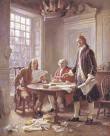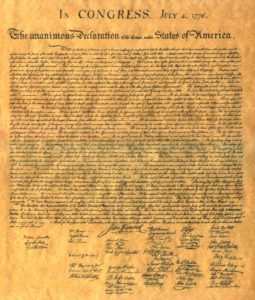To whom were the writers of the Declaration referring when they wrote “Appealing to the Supreme Judge of the world for the rectitude of our intentions?” Was it a mystical God that no one could define? Was it any god at all? These are important questions in our day. We are often told that those who signed the Declaration must have appealed to a god of inequality since they were practicing inequality. Also, those who ratified it were all men and thus they must have appealed to a god of male chauvinism. Our focus, however, should not be on the frailty of the humans who enacted it, but the nature of the God they appealed to and who was also the source of their rights.
The Declaration opens with the idea that the United States has a right to be a separate nation because of “the laws of nature and of nature’s God.” Where did this phrase come from? Well, it is derived from the Biblical premises of William Blackstone’s Commentaries on the Laws of England. The “laws of nature” was a phrase that meant “creation law.” He wrote, “When the Supreme Being formed the universe, and created matter out of nothing, he established certain laws… Man, considered as a creature, must necessarily be subject the laws of his creator…. this will of his maker is called the law of nature.” The phrase “of nature’s God” meant the “law of God.” As Blackstone wrote “The doctrines… we call the revealed or divine law, and they are to be found only in the Holy Scriptures… upon these two foundations, the law of nature and the law of revelation, depend all human laws.” There is only one God that has revealed Himself in both a written revelation and creation, and that is the God of the Bible.
 “We hold these truths to be self-evident” is a phrase depicting the biblical doctrine of epistemology or simply how we discern what is true. The Bible reveals that God gives self-evident truth, called in theology “common grace” as declared in Romans 1:18-20. In other words, God reveals Himself through His creation in such a way that everyone can discern certain truths, so we are all “without excuse.” The idea of self-evident truth is not a Renaissance idea that man is autonomous and can determine what is true all by himself. Instead, it is built on the premise that God is the Creator and has revealed certain truths such as life, liberty and property from the very first chapter of the Bible.
“We hold these truths to be self-evident” is a phrase depicting the biblical doctrine of epistemology or simply how we discern what is true. The Bible reveals that God gives self-evident truth, called in theology “common grace” as declared in Romans 1:18-20. In other words, God reveals Himself through His creation in such a way that everyone can discern certain truths, so we are all “without excuse.” The idea of self-evident truth is not a Renaissance idea that man is autonomous and can determine what is true all by himself. Instead, it is built on the premise that God is the Creator and has revealed certain truths such as life, liberty and property from the very first chapter of the Bible.
The Declaration further declares that “all men are created equal.” This phrase pioneered a unique biblical doctrine that before God the position of all human beings, male and female, is equality. Mankind throughout the centuries has made people unequal for the purpose of controlling them, whether on the basis of race, wealth, gender or royalty. But the only God who has placed all human beings as equal in position before the law is the God of the Bible. It is precisely this premise that became the foundation for the progressive equality of the races, sexes as well as putting both leader and people under the same rule of law, giving us a government “by the consent of the governed” rather than by “ruler’s law.” In America we progressed toward true equality because of the God we enthroned; we were not practicing it at the time of this Declaration. This should not surprise us, since our own profession of surrendering to Christ’s Lordship is a declaration far beyond what we are living as well.
 This document further declares that we are each “endowed by our Creator with certain unalienable Rights.” These rights of life, liberty and property (or the pursuit of happiness) were given by God in Genesis 1:28 when He said we were to be fruitful and multiply (life), replenish the earth (creatively take the resources of the earth and produce; which requires liberty), and dominion (or stewarding property). The only God that has ever given unalienable rights, empowering men and women to self-government, is the God of the Bible. We can rejoice today that the God we serve empowers His subjects to freely choose to serve Him rather than treating humanity as robots or servile slaves.
This document further declares that we are each “endowed by our Creator with certain unalienable Rights.” These rights of life, liberty and property (or the pursuit of happiness) were given by God in Genesis 1:28 when He said we were to be fruitful and multiply (life), replenish the earth (creatively take the resources of the earth and produce; which requires liberty), and dominion (or stewarding property). The only God that has ever given unalienable rights, empowering men and women to self-government, is the God of the Bible. We can rejoice today that the God we serve empowers His subjects to freely choose to serve Him rather than treating humanity as robots or servile slaves.
After listing the violations of English Law that King George III practiced in relation to the Colonies, proving he was indeed a tyrant rather than a public servant, the delegates of the Continental Congress that were in Philadelphia that hot summer of 1776 “appealed to the Supreme Judge of the World” for the rectitude (righteous or morally upright conduct) of their intentions. They appealed their cause to the highest court – the court of heaven! They placed their “lives, fortunes and sacred honor” in the Hands of one whose justice is perfect and who never fails. The God of the Bible is a Supreme Judge, and specifically Christ “has been given authority to execute judgment” (John 5:27).
 In closing, the delegates wrote “with a firm Reliance on the Protection of Divine Providence.” They had already referenced God’s laws and the fact that He holds all men and women accountable for their actions. They had also referenced God as Creator and that His existence and nature is clearly self-evident. He is Supreme Judge, also, and our own Massachusetts Constitution calls him “the Great Legislator of the Universe.” These aren’t watered down names of a God no one knows. These are attributes of the God of the Bible. But the final reference made to Him is the title of Providence. The definition of Providence, from Webster’s 1828 Dictionary was simply “the care and superintendence which God exercises over his creatures… by divine providence is often understood God himself.” The God of the Bible is Sovereign and as a result His Providential care is unique. Only this God of the Bible is both transcendent (separate from us) and immanent (close to us) at the same time. Ultimately, the Declaration is a prayer of dependence on God and not just declaring independence from England.
In closing, the delegates wrote “with a firm Reliance on the Protection of Divine Providence.” They had already referenced God’s laws and the fact that He holds all men and women accountable for their actions. They had also referenced God as Creator and that His existence and nature is clearly self-evident. He is Supreme Judge, also, and our own Massachusetts Constitution calls him “the Great Legislator of the Universe.” These aren’t watered down names of a God no one knows. These are attributes of the God of the Bible. But the final reference made to Him is the title of Providence. The definition of Providence, from Webster’s 1828 Dictionary was simply “the care and superintendence which God exercises over his creatures… by divine providence is often understood God himself.” The God of the Bible is Sovereign and as a result His Providential care is unique. Only this God of the Bible is both transcendent (separate from us) and immanent (close to us) at the same time. Ultimately, the Declaration is a prayer of dependence on God and not just declaring independence from England.
John Jay wrote “No human society has ever been able to maintain order and freedom, both cohesiveness and liberty, apart from the moral precepts of the Christian religion.” Calvin Coolidge observed that the ideas for the Declaration had been preached from the pulpit in the late 17th century by Pastor John Wise of Ipswich. In conclusion then, not only is the God of the Declaration the God of the Bible, but the inspiration for its ideas came from the pulpit of a preacher who declared Independence in 1687 from the tyrant Governor Andros. His republished works in 1772 inspired the Declaration. That is why the town of Ipswich has on its seal these words, “Birthplace of American Independence 1687.”







